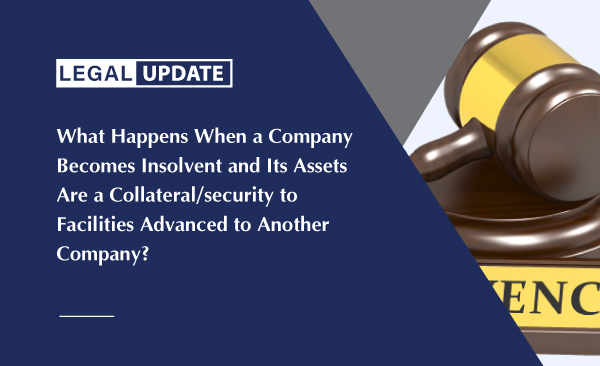It is a common practice in the business world for Parent and Holding Companies to provide collateral and guarantee support for loan financing to their subsidiaries and sister companies. There are usually no legal restrictions whatsoever on issuing cross guarantees or assets as collaterals subject to the entity that provides the collateral support issuing board resolutions approving the same in accordance with their MEMARTS and it in some instances, also deriving some commercial benefit for doing so.
Thus, a financier should be cognizant of various critical issues prior to advancing banking facilities to a company whose facilities will be secured by assets of another company.
Separate Legal Personality
Firstly, a company has a distinct and separate legal personality hence one company cannot be held liable for debts of another. Also, the property of a company is distinct from that of its shareholders and the shareholders have no proprietary rights to the company’s property other than their shares.
In this article, we seek to point out the fact that parent and holding companies have common directors, however they are treated as two distinct and separate legal entities and their liabilities cannot also be conjoined.
The above position was echoed in Paul Stuart Imison v Jodad Investments Ltd [2019] eKLR wherein the court held that in law, Parent and Holding Companies are distinct and have separate legal entities. The same was reiterated by the Court of Appeal in Hannah Maina T/A Taa Flower vs Rift Valley Bottlers Limited [2016] eKLR where it held that the Parent Company could not be held liable for the debts of its subsidiary Company as the two were distinct and had separate legal entities.
Finally, a case in point is the Re: Southard Limited [1979]3 All ER564 where it was espoused that a Parent company may be saved from the litters and debts of an insolvent subsidiary company. It held as follows:
“…a parent Company may spawn a number of subsidiary companies, all directly or indirectly controlled by the Shareholders of the parent Company. If one of the subsidiary companies turns out to be the runt of the litter and declines into insolvency to the dismay of the creditors, the parent Company and the subsidiary companies may prosper to the joy of the Shareholders without any liability for the debts of the insolvent subsidiary.
Precautionary measures that ought to be on the financier’s checklist
Below are some of precautionary measures that a financier ought to have in check before traversing these risky financial grounds.
Confirm whether the Securing company [Parent Company] is a holder of floating charges;
Confirm whether the terms and conditions outlined in the Debenture or Charge document are precautionary and protective in nature. This is to ensure that the financier is not exposed. To wit, some of the key terms to incorporate are as follows;Immediacy of the amount due and payable under the debenture or charge. This term will ensure that assets of the insolvent subsidiary are inter-available to settle the facilities advanced to the borrowing company. In a circumstance where the assets of the securing company are liquidated and there is a surplus, the same can be used to settle the facilities advanced to the borrowing company.Commencement of an insolvency procedure shall not automatically discount/disregard the assets of the securing company. This will ensure that in the event administration of the securing company succeeds, its assets will still be security for the facilities advanced to the borrowing company. Alternatively, if the company assets are liquidated and there is a surplus on the value of its assets, the surplus can still be utilized by the financier in paying up the outstanding amount due from the borrowing company.
In addition, a financier should provide in the security document that upon the securing company being declared insolvent and/or subsequently being put under any insolvency procedure, the borrowing company shall forthwith procure another security for the facilities advanced to it. Failure to capture the term above will greatly expose the financier to risk as the facilities advanced to the borrowing company will be rendered unsecured. The financier should therefore immediately upon getting wind of the securing company’s insolvency, secure its interests by calling for another security from the borrowing company for the facilities advanced.
Conclusion
The upshot of the foregoing is that a financier should to take cognizance of the fact that even in situations where two companies are close-knit, each company, being a limited liability company must operate within the ambit of the Companies Act which confers upon such companies the status of a separate legal entity.
This article is provided free of charge for information purposes only; it does not constitute legal advice and should be relied on as such. No responsibility for the accuracy and/or correctness of the information and commentary as set in the article should be held without seeking specific legal advice on the subject matter. If you have any query regarding the same, please do not hesitate to contact Commercial Department at WACommercial@wamaeallen.com
 Loading...
Loading...
About the author
Virginiah is a promising transactional advocate specializing in Real Estate and SeVirginiah is a seasoned Advocate with great expertise of more than three years in Real Estate, Banking and Finance, Commercial and Corporate Law. She is a focused and self-motivated advocate successful at strategically managing operations with proven team performance. She is a highly organized, excellent communicator, detail-oriented, leader skilled in directing high-performing teams to develop solutions and solve operational and technical problems. Her prowess has benefitted the firm by way of greater client acquisition, client management, and client retention.curitization, Banking and Finance.
Flavious is an Associate in the Real Estate and Securitization Department.
She has vast knowledge and hands on experience in Real Estate, Securitization, Banking, Finance, Company Law, Corporate Governance, Insolvency and Commercial Law. She also has keen interest in policy making and emerging legal commercial issues in general.
She is a promising transactional advocate with exemplary interpersonal skills and exudes diligence, integrity, resilience, confidence and great enthusiasm in all her tasks.
Denis Mutugi specializes in Commercial Litigation and Alternative Dispute Resolution.
Denis graduated with a Bachelor of Laws, LLB (Hons) from The University of Nairobi in 2021 and was admitted to the Roll of Advocates of the High Court of Kenya in the year 2023.
Denis has amassed a considerable wealth of experience in conducting legal research on various complex legal matters touching on Commercial, Insurance, Employment and Insolvency law and bankruptcy.
-
Denis Mutugihttps://wamaeallen.com/author/denis-mutugi/
-
Denis Mutugihttps://wamaeallen.com/author/denis-mutugi/













